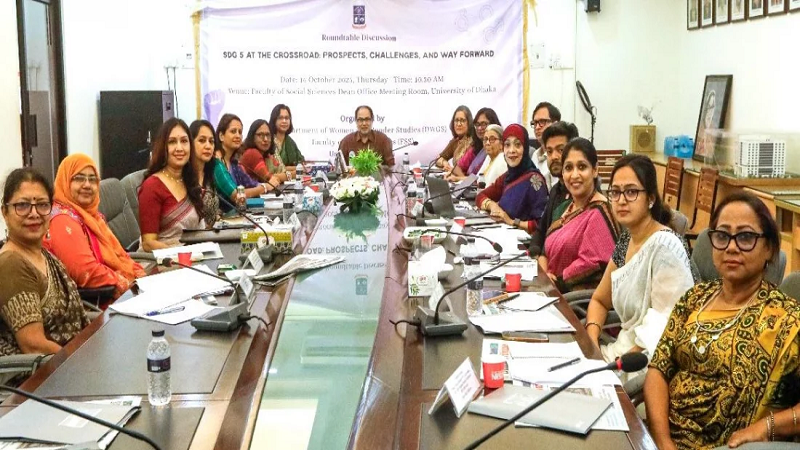
Experts urge intersectional lens on gender justice at DU roundtable
Despite notable strides in women’s education and workforce participation, Bangladesh’s journey toward gender equality remains fraught with deep-rooted systemic and structural barriers that continue to silence marginalized voices.
This critical reflection shaped the opening of a high-level roundtable hosted by the Department of Women and Gender Studies at the University of Dhaka, marking its 25th founding anniversary with the theme “SDG 5 at the Crossroads: Prospects, Challenges and Way Forward for Gender Equality in Bangladesh.”
Held at the Faculty of Social Sciences Dean’s Office Meeting Room, the event convened leading academics, policymakers, gender experts, development partners, and students to assess Bangladesh’s progress and ongoing challenges in achieving gender equality under the Sustainable Development Goals (SDGs).
Delivering the keynote address, Professor Dr Sayed Saikh Imtiaz emphasized the need for an intersectional approach to addressing inequality.
“While Bangladesh has made commendable progress in women’s education and workforce participation, the road ahead demands deep reflection on the systemic and structural barriers that continue to silence marginalized voices,” he said.
Opening the session, Professor Dr Tania Haque reflected on the department’s 25-year journey in advancing feminist research, pedagogy, and activism.
“Our department has been at the forefront of promoting gender-sensitive discourse and influencing national policy frameworks,” she said.
Professor Dr Taiabur Rahman, dean of the Faculty of Social Sciences, praised the department’s leadership in shaping the national gender agenda.
“As we approach the 2030 SDG target, the focus must shift from policy rhetoric to tangible, transformative implementation,” he said.
Discussions spanned critical issues such as gender-based violence, economic empowerment, climate vulnerability, and the digital gender divide.
Speakers underscored the importance of cross-sector collaboration—among academia, government, development partners, and grassroots organizations—to ensure gender equality remains central to Bangladesh’s development trajectory.
Dilara Begum emphasized that institutional accountability must accompany policy commitments. “Gender equality cannot thrive without strong, gender-responsive governance at every level,” she said.
Farah Kabir called for renewed urgency in addressing intersecting inequalities. “We must move from token inclusion to structural transformation—women’s rights are not an add-on to development,” she noted.
Dr. Fauzia Moslem underscored the role of women’s movements in sustaining progress. “Grassroots activism has been the backbone of Bangladesh’s gender journey, and its strength must be protected,” she said.
Dr Sabiha Yeasmin Rosy, chairperson and associate professor of the department, summarised the discussion, highlighting that there is significant room for further work. She demanded an holistic approach using an intersectional lens, focusing on the gender-sensitive roles of social, economic, and political transformations, which can bring forth gender justice and ensure inclusive participation in different contexts. Moreover, a collaborative effort between academia and activists can help pave the way for achieving the Sustainable Development Goals (SDGs) more effectively.
The event concluded with a collective call to renew national commitment to feminist leadership and gender justice.
The roundtable featured an impressive lineup of speakers and discussants, including Professor Dr. Tania Haque from the Department of Women and Gender Studies; Dilara Begum, Joint Secretary, Ministry of Women and Children Affairs; Farah Kabir, Country Director, ActionAid Bangladesh; Dr. Fauzia Moslem, President, Bangladesh Mahila Parishad; Associate Professor Dr Sabiha Yeasmin Rosy (Women and Gender Studies, DU), Tapati Saha, Unit Manager, Gender Responsive Governance Programme, UN Women Bangladesh; Sabina Parvin, Social Development Specialist (Gender & GBV), The World Bank; Sharmin Islam, Gender Team Leader, UNDP Bangladesh; Khadija Khondkher, Senior Programme Officer, ILO; Nasima Akhter, Member, Naripokkho; Laila Tasmia, Advisor, Economic Cooperation and Private Sector Development, GIZ; Salima Sultana, Senior Project Manager, Save the Children; Abu Naser Rayhan, Programme Analyst (Gender and Child Marriage), UNFPA Bangladesh; and Ashrafun Nahar Misti, Founder and Executive Director, Women with Disabilities Development Foundation (WDDF).
The celebration not only marked a milestone in academic excellence but also reaffirmed the University of Dhaka’s pioneering role in promoting gender equity and inspiring future generations to build a more inclusive and just society.
Source: Dhaka Tribune
News Link: https://www.dhakatribune.com/bangladesh/394127/experts-urge-intersectional-lens-on-gender-justice